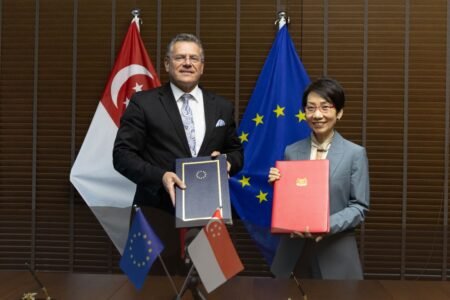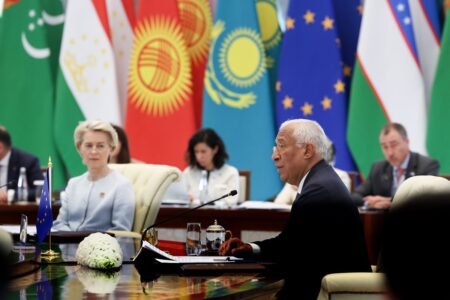The first Eastern Partnership (EaP) summit in Prague on 7 May gathered leaders from the EU Member States, EU institutions and Armenia, Azerbaijan, Belarus, Georgia, Republic of Moldova and Ukraine to launch a new framework of reinforced bilateral and multilateral cooperation. The European Commission says this initiative will lead to deepening of political and economic relations, more energy security, increased mobility and will give an additional boost to pro-democratic and market oriented reforms in partner countries.
Advertisement
Because the time is ripe to step up EUs relations with its Eastern neighbours. Events in the countries in Eastern Europe and in the Southern Caucasus affect the EU. Successive EU enlargements have brought these countries closer to the EU and their security, stability and prosperity increasingly impacts on the EUs. All these countries, to varying degrees, are implementing political, social and economic reforms, and have stated their wish to come closer to the EU.
The policy towards these countries has to be strong, proactive and unequivocal: with the Eastern Partnership the EU offers its Eastern partners concrete, far-reaching support for democratic and market-oriented reforms and thus contribute to the their political and economic stability. The multilateral component of the Eastern Partnership gives the EU an additional instrument to foster reforms, by providing a forum for the six partner countries to exchange experience and information in the framework of four platforms.
All 27 EU Member States and Armenia, Azerbaijan, Belarus, Georgia, Republic of Moldova and Ukraine.
While the Eastern partners may not have identical objectives in their relationship with the EU they all seek to intensify their relations with the EU. The Eastern Partnership is the reply of the EU to the challenges and aspirations of the partner countries as the EU has a vital interest in seeing further economic development, greater democratic governance and increased stability in the Eastern neighbourhood. Based on the progress made in the European Neighbourhood Policy (ENP), the Eastern Partnership offers both bilateral and multilateral measures for enhanced cooperation. The partner countries will come closer to the EU depending on their individual capabilities and timeframe and together Eastern partners will cooperate more on issues related to the EU, share their experience and best practices among themselves.
No, the principle of the ENP will be maintained: how far we go in relations with each country will continue to depend on the progress made by the partners in their reform and modernization efforts. The Eastern Partnership is clearly about both common interests and shared values.
Belarus is an important Eastern neighbour of the EU, interested in developing its relations with us. Depending on its own choices and decisions, Belarus will be able to benefit from the Eastern Partnership to intensify bilateral relations with the EU. Belarus has a real opportunity to become an active partner of the EU in the framework of the European Neighbourhood Policy provided that the country embarks further on fundamental democratic and economic reforms and brings itself closer to common values. Initially, Belarus could participate in the activities of the multilateral platforms.
This is not at all an anti-Russian initiative. We are responding to a desire expressed throughout the countries in our Eastern neighbourhood who want to substantially deepen and widen their relations with the EU. Russia remains a crucial partner for the EU, with whom we are currently negotiating a new comprehensive agreement. We always stress that the members of the EaP will need good working relations with all their neighbours, including the Russian Federation.
- New association agreements including deep and comprehensive free trade agreements, for those willing and ready to take on the far-reaching commitments with the EU that these entail;
- Comprehensive programmes funded by the EU to improve partners administrative capacity in order to be able to take up our offer;
- A conclusion of mobility and security pacts, allowing for easier legitimate travel to the EU while at the same time stepping up efforts to combat corruption, organized crime and illegal migration. These pacts would also cover the upgrading asylum systems to EU standards and the establishment of integrated border management structures, etc. The ultimate long term goal would be full visa liberalization, on a case by case basis, provided that conditions for well-managed and secure mobility are in place;
- The Commission will study possibilities for labour mobility with aim of further opening of the EU labour market;
- Enhanced energy security in the partner countries themselves and with the European Union, including through support to investment in infrastructure, better regulation, energy efficiency and more efficient early warning systems to prevent disruption of supply;
- Multilateral track platforms – will support individual countries’ efforts by providing a framework in which common challenges can be addressed. It will include seminars to improve understanding of EU legislation and standards, sharing of experience, and where appropriate development of joint activities. Four policy platforms are proposed: on Democracy, good governance and stability; Economic integration and convergence with EU policies, Energy security; and Contacts between people;
- Enhanced cooperation on environment and climate issues;
- Increased people-to-people contacts and greater involvement of civil society and other stakeholders.
- Additional financial support of 350 million for the period till 2013.
- Within the framework of the multilateral track, five high profile initiatives (flagship initiatives) will serve the countries’ interests and at the same time our own:
- border management programme,
- integration of electricity markets, energy efficiency and renewables,
- an SME facility,
- Southern corridor and
- response to disasters.
The European Union already provides funding to the Eastern Partner countries for bilateral programmes under the European Neighbourhood Policy Instrument (ENPI). Between 2007 and 2010 spending is as follows:
- Armenia 98.4 million;
- Azerbaijan 92 million;
- Georgia 120.4 million (additional funding up to 500 million will be available to cope with the consequences of the war in Georgia in August 2008),
- Moldova 209.7 million;
- Ukraine 494 million
In addition to the ENPI partner countries can profit from the funds from:
- the Governance Facility (maximum 50 million annually for all ENP countries);
- the Cross Border Cooperation thatbrings together regions of EU Member States and ENPI partner countries sharing a common land or sea border. In 2008 the CBC East adds up to approximately 25,6 million;
- the Neighbourhood Investment Facility (NIF) thatoperates with pooled grant resources of the Community and Member States, which are used to leverage International Financial Institutions loan financing. NIF focuses on the priority sectors Energy, Environment and Transport, but support may also be provided for SMEs and Social Sector development. There are projects ongoing ranging from Energy Transmission System, Technical assistance for Improvement of Water and Sanitation Systems, to the Modernisation Project at Chisinau Airport. In 2008 the NIF has allocated almost 70 million to projects in the East.
Total assistance for the six Eastern neighbours will gradually grow from 450 million in 2008 to 785 million in 2013, an increase of nearly 75%. This will mean allocating a supplementary envelope of 350 million in addition to the planned resources for the period 2010-2013. Moreover we will refocus 250 million that was already allocated to the ENP regional east programme to initiatives relevant for the implementation of the Eastern Partnership, bringing the total for implementing this new initiative to 600 million,
By effectively bringing Eastern partners closer to the EU, like the ENP, the Eastern Partnership will contribute to the stability and security on the EUs borders while enhancing good neighbourly relations and effective cooperation among partners. The Eastern Partnership will also seek to promote confidence in the region by increasing political contacts between partners (including among administrations, members of parliaments, NGOs and citizens) as well as reducing trade barriers. The Eastern Partnership foresees in addition more cooperation on specific issues within the EUs Common Foreign Security Policy and European Security Defense Policy, including the participation of partner countries in EU missions and exercises and the coordination of diplomatic activities. Security-related early-warning systems will be enhanced, with particular focus on conflict areas. Closer cooperation on arms-export practices and non-proliferation is also envisaged.
The development and involvement of the civil society is a key factor for the success of the democratic and market-oriented reforms. The Commission proposes to support civil society actors and to engage them in the initiative through the establishment of an Eastern Partnership Civil Society Forum on which consultations have already been held. The forum will promote contacts between civil society actors as well as facilitate their dialogue with public authorities.
The participation in the Eastern Partnership does not contain an accession perspective but it will go ahead without prejudice to individual participating countries’ aspirations for their future relationship with the European Union.
The success of this initiative will depend on strong political will of EU Member States and partner countries alike joint ownership is essential in this.
The Commission will play a crucial role in making the multilateral framework an effective tool for cooperation and in developing the Comprehensive Institution Building Programmes with individual countries to offer more intensive support for reforms.
- In principle there will be biannual meetings of Heads of States or Governments involving the 27 EU Member States and the partner countries of the Eastern Partnership.
- Annual meetings of Ministers of Foreign Affairs would review progress and provide more detailed political guidance.
- Senior officials engaged in reform work in the relevant policy areas would meet at least twice a year. These meetings, prepared and chaired by the Commission, would take place within the framework of four thematic platforms (Democracy, good governance and stability; Economic integration and convergence with EU policies, Energy security; and Contacts between people). First platform meetings in all four areas will take place already in June 2009.
- Panels to support the work of each of the platforms would meet as often as appropriate and in the format according to need.
Bilateral cooperation will continue through the structures of the European Neighbourhood Policy.
NO. The EaP complements the Black Sea Synergy (covering five Eastern ENP countries, Russia and Turkey, but not Belarus) and other regional cooperation initiatives. The Black Sea Synergy aims to solve problems which require region-wide efforts and attention. Its centre of gravity is the Black Sea. The Eastern Partnership will pursue alignment of partner countries with the EU. Its center of gravity will be Brussels. The European Council in March 2009 underlined the EU’s commitment to strengthen the Black Sea Synergy and to support its implementation, and the new Black Sea partnerships are being launched in the coming months (e.g. environment and transport but also a Black Sea Civil Society Forum).







